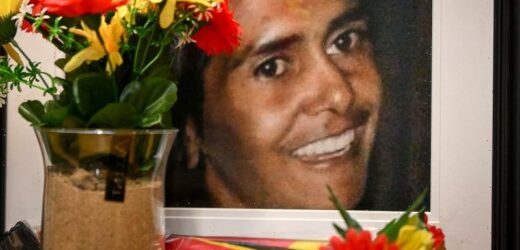Veronica Nelson never stood a chance. The findings of the inquest into her 2020 death in custody revealed on Monday, as Victorian coroner Simon McGregor detailed, that Nelson had been let down badly by the corrections system. This is a system, he found, that continues to discriminate against Indigenous people but was so riddled with incompetence, wilful neglect and human failures that her fate was sealed virtually from the moment of her arrest.
Tributes to Veronica Nelson inside the Coroners Court last year.Credit:Eddie Jim
Taken into custody on suspicion of a minor offence in Spencer Street, Melbourne, on December 30, 2019, Nelson, a Gunditjmara, Dja Dja Wurrung, Wiradjuri and Yorta Yorta woman, died in her cell at the Dame Phyllis Frost Centre while on remand days later. The coroner found she was suffering withdrawal symptoms from chronic opioid use and had a rare gastrointestinal condition called Wilkie’s syndrome, which can lead to malnutrition. She weighed just over 30 kilograms.
An expert medical panel told the inquest her life could probably have been saved had she been sent to hospital. But the coroner found prison staff had failed to recognise that she was in need of urgent medical care. Decisions about her treatment “were made on the basis of incomplete and inaccurate information”. The medical assessment and treatment by the prison doctor was “inadequate” and his records of Nelson’s care were “inaccurate”.
As Nelson’s condition deteriorated, the coroner found, prison officers ignored her cries for help as she lay dying in her cell, “prompting me to ponder how the people who heard them and had the power to help her did not rush to her aid and send her to a hospital, or simply open this door of the cell to check on her”. For Nelson’s family and friends that simple statement must carry so much pain. What might have been different had a more sympathetic prison officer opened that door? Maybe nothing; maybe everything.
What shocked most was the indifference: that as Nelson lay dying the nurse responsible for her care was watching a movie on her computer. Corrections staff treated Nelson in a “cruel and degrading” manner.
Yet Nelson’s plight did not ultimately rest with a handful of individuals, the particular prison staff whom it was her misfortune to encounter. At every step she was treated by the Victorian corrections system as somebody not worth even following the rules for. She received inadequate legal representation. She was handcuffed unnecessarily and in breach of her rights. She was not treated appropriately as an Indigenous woman – again a breach of her rights. She was not transferred to hospital when she should have been. Critically, she was not granted bail after her initial arrest: the first failure in the chain of events that eventually led to her death.
There was some small justice for Nelson’s family and supporters on Monday when the coroner said he had referred the operator of the prison’s health care services, contractor Correct Care Australasia, to prosecutors to consider criminal charges after finding the company may have breached occupational health and safety laws.
But this inquest has demonstrated beyond doubt that Victoria’s bail laws are not fit for purpose. Amended after the Bourke Street massacre, they are now so punitive that many Victorians who pose no risk to the community have found themselves incarcerated unnecessarily while they await trial, having been refused bail.
The coroner described the 2018 changes as “a complete and unmitigated disaster” and said the laws affected Indigenous Australians at “grossly disproportionate rates”. He called the Bail Act incompatible with the Charter of Human Rights and recommended a review – a recommendation the state government should heed, and promptly.
Attorney-General Jaclyn Symes said the government would carefully consider the coroner’s recommendations. It is encouraging that the state opposition, whose former law-and-order bullheadedness has made reform difficult until now, has said it will work constructively with the government. Because every day the current profoundly dangerous laws remain in place we risk a repeat of the tragedy that took the life of Veronica Nelson.
Most Viewed in National
From our partners
Source: Read Full Article


